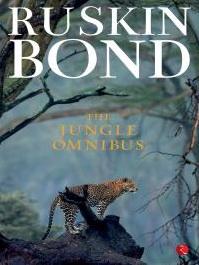

An Englishman living in India, with a penchant for the natural environment, Ruskin Bond’s work hearkens back to the days of the Raj, when Kipling and co spun tremendous tales of the awe of nature; ‘The Jungle Omnibus’ remains stoically true to character.
A collection of poetry and short stories, the book immediately transports the reader to hitherto unknown lands, where tigers, elephants and panthers roam free, and flowers and trees grow as lush as in Eden itself.
An extremely well written book, Bond’s descriptive style complements his effusive register perfectly, all of which are meticulously included to nurture the imagination and implant images of the Sundarbans and Himalayas directly into the reader’s consciousness. Furthermore, Bond’s prolific use of allegories and anecdotes mean that the book often feels like folklore, as if some wizened old man is divulging his triumphs and travails over tea, around a fire, which is unique.
Bond’s world is very different from ours, thus the narration appears unorthodox, even whimsical. For example, one of the books’ finer exponents is a five page short story told from the point of Speedy, a crow, who adopts a family, and with Crow-ish brazenness, drives them to madness with his daring antics. However, in many stories, Bond’s ebullient tone does somewhat placate the highly poignant and relevant social commentary that forms the spine of the collection. In one story, Bond is critical of the trigger happy nature of people, where animals are driven to extremes by a hunter. In another, Bond explores the devastating power of nature, and the struggle of a village to weather the monsoon floods. Overall, the collection is well balanced, with the customary tales of man eating tigers juxtaposing effectively with poems of railway stations and jungle rest houses.
Considered holistically, the subject of the book is both nostalgic and in a contemporary tone. Ruskin Bond, by all accounts, is part of a dying breed, unburdened by overly technical language and the creation of suspense, who simply writes what he sees. Thus, Bond is able to superimpose the modern problems of deforestation and pollution with those of man eaters and goat killers.
In many places the book reads like environmental activism and in others like a Dickensian epic, yet throughout it retains a natural exuberance, making it a thoroughly entertaining, as well as enlightening read.
I would highly recommend it.